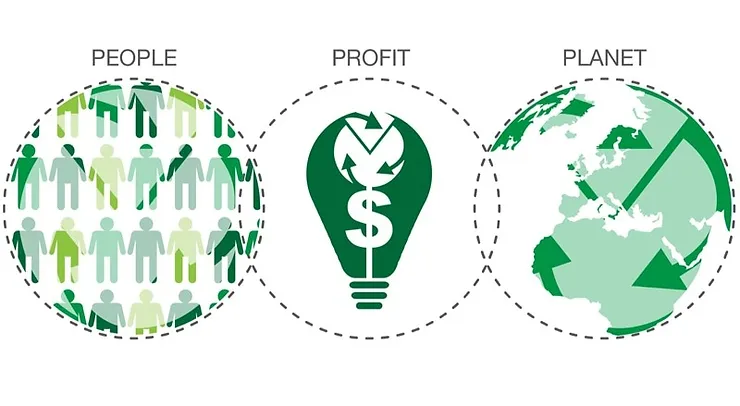
Biodiversity conservation is emerging as a powerful tool for businesses to achieve their CSR (Corporate Social Responsibility) goals while fostering long-term sustainability. Biodiversity conservation refers to the protection, management, and sustainable use of the Earth’s rich variety of plants and animals, along with where they live. It’s like taking care of our natural world and making sure it can thrive for a long time. It is a fundamental pillar of environmental stewardship and sustainable development. Corporate Social Responsibility (CSR), on the other hand, encompasses a company’s initiatives to assess and take responsibility for its impact on the environment and social well-being. It reflects a commitment to ethical business practices that go beyond mere profit-making.
“Sustainability is no longer about doing less harm. It’s about doing better.” – Jochen Zeitz
At its core, Corporate Social Responsibility (CSR) is all about considering the things that the public cares about and making them a part of how a company operates every day. When a company embraces CSR, it means they’re committed to doing business in a way that shows they care about protecting the environment, treating employees fairly, getting involved in the community, and maintaining good relationships with their suppliers (Business & Biodiversity Resource Center). Biodiversity conservation is not just an environmental issue; it is a business necessity. Diverse ecosystems are better equipped to adapt to changing environmental conditions, reducing risks associated with climate change, pests, and diseases. For businesses, this translates into more reliable and resilient supply chains. Moreover, consumers today are more environmentally conscious than ever. Companies that actively participate in biodiversity conservation gain a competitive edge by enhancing their brand’s image and reputation. It demonstrates a commitment to sustainable practices, earning the trust of eco-conscious consumers.
CSR is not just about writing checks to charitable organizations; it’s about integrating sustainable practices into a company’s core operations. Biodiversity conservation is a natural fit for this integration, as it directly contributes to the sustainability of both the environment and the business itself. The benefits of biodiversity conservation for businesses are diverse. Biodiversity sustains essential ecosystem services like pollination, water purification, and pest control, which directly benefit agriculture, pharmaceuticals, and various other industries. Engaging employees in biodiversity conservation projects fosters a sense of purpose and pride. It can boost morale, productivity, and retention rates, contributing to a positive corporate culture.
Patagonia, the renowned outdoor apparel, and gear company has established itself as a leader in corporate responsibility and sustainability by consistently incorporating biodiversity conservation into its CSR initiatives. A notable effort was their partnership with The Conservation Alliance, a group of outdoor industry companies devoted to safeguarding North America’s wilderness areas. Patagonia committed a portion of its sales to financially support grassroots environmental organizations, focusing on land and water protection, habitat restoration, and conservation projects. Additionally, the company promoted sustainable practices across its supply chain and actively engaged its customer base in environmental advocacy. This dedication resulted in substantial contributions to grassroots conservation efforts, the protection and restoration of crucial habitats, and the cultivation of a passionate and loyal customer community. Patagonia’s authentic commitment to biodiversity conservation significantly enhanced its CSR profile and brand image, earning recognition for its unwavering dedication to environmental impact reduction and conservation.
Companies can take a variety of approaches to promote biodiversity conservation. Agrihood, for instance, specializes in impact-based afforestation and agricultural initiatives that not only benefit the environment but also engage local communities. Whether it’s creating urban green spaces, restoring native habitats, or implementing sustainable agriculture practices, Agrihood’s projects align perfectly with CSR objectives. Another option is habitat restoration initiatives. Companies can actively participate in restoring degraded habitats by planting trees, and reintroducing native species. This contributes to local biodiversity while mitigating environmental damage. We also offer comprehensive sustainability training programs for your workforce and local community. Our sustainability trainings cover everything from climate change and net zero strategies to capacity building of farmers and community.
In conclusion, the union of biodiversity conservation and corporate social responsibility is a symbiotic relationship that benefits not only businesses but also the planet and its communities. As consumers become more environmentally conscious, companies that embrace biodiversity conservation as a core CSR initiative will thrive, fostering a sustainable future for all. At Agrihood, we are proud to be at the forefront of this movement, offering innovative, low-cost impact base projects and sustainability training that engage communities and promote biodiversity conservation. If you’re interested in aligning your CSR goals with sustainable practices, feel free to reach out to us for more information on how we can collaborate towards a sustainable, more responsible future.


